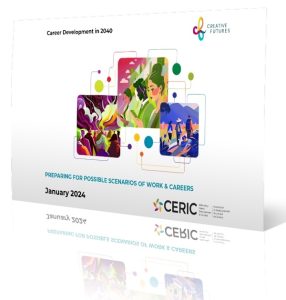|
Getting your Trinity Audio player ready...
|
Last year, I had the chance to participate in a research interview about the future of career coaching with Creative Futures. The researchers led participants in a discussion with other career practitioners on different future labour scenarios – part of a larger, CERIC-funded project resulting in the report “Career Development in 2040: 10 Major Changes Impacting the Futures of Work and Workers in Canada.”

In the group discussion, we were presented with three different scenarios. The first scenario, Taru’s world, reflects a technical world offering remote work options and the importance of AI in the workplace. The scenario seems realistic, with the current explosion of AI and employees seeking remote and hybrid work options that are more conducive to managing their home life. This scenario envisions employers seeking job candidates from around the globe.
I wonder, will the impact of AI influence how accurately candidates represent their skills and qualifications? The other major concerns of living in an increasingly digital world include the lack of social interaction and teamwork skills, because employees may work anywhere around the world.
The second scenario, Clara’s world, is the most traumatic. In this scenario, Florida has been engulfed by the ocean and Canada has allowed many people from the United States to relocate into major Canadian cities. To me, the society we know today seems turned upside down.
There are no companies, no factories, no educational system or supply chain. The only work people can find is manual labour or volunteering to assist people to meet their basic needs. In this scenario, there is no discussion of career development or future promotions, as work is about making a living. It reminds me of the Great Depression, when people worked survival jobs to exist.
The last scenario, Alex’s world, is very idealistic and unrealistic – too much of a perfect world. The work week has fewer hours, there is more use of computer technology and people are working and living longer. People take more courses, as post-secondary education is free. The main concern is, how will people react when things are not going well?
What this means for the role of career professionals
In all three scenarios, there is an emphasis on continuous training for career practitioners in the areas of mental health; diversity, equity and inclusion; and coping with economic or environmental challenges. It is critical that people working in the field of career development help individuals be prepared for the future, with more enrolment in the trades, IT fields and social services. The future of career professionals will be more challenging, working with a diversity of clients across time zones and being adaptable to global environmental and financial crises.
The government agencies that employ career practitioners may need to develop workshops on communication skills, teamwork, how to increase social interaction, coping strategies and dealing with rude comments in the workplace. The role of career professionals may become more of an emotional support system for individuals coping with different work situations. This may require career practitioners to continue to take courses on mental health, new technologies and even human resources to collaborate with companies regarding internal talent retention and progression.
“The future of career professionals will be more challenging, working with a diversity of clients across time zones and being adaptable to global environmental and financial crises.”
Career professionals also need to be aware of burnout – for themselves and their colleagues. They need to take steps to preserve their own self-care, which may mean working fewer hours or reducing caseloads to be able to provide career and emotional support to their clients.
We need more partnerships between not-for-profit organizations operating on government funding and private career coaches. After all, our work shares the goal of helping clients find meaningful employment. It is also important to establish partnerships between career services and companies to provide internal employee development. Collaborating with HR professionals can support the development of client job opportunities and growth for employees, while also meeting businesses’ talent needs.
Regardless of whether these visions of the future of work come to pass, career professionals need to work together to support jobseekers’ career development and to support each other in navigating future challenges and in our personal growth.




